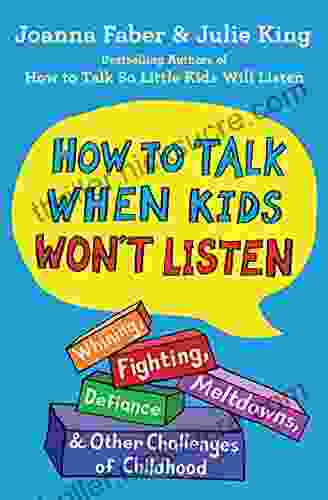How to Talk to Kids When They Won't Listen: A Comprehensive Guide for Parents

4.7 out of 5
| Language | : | English |
| File size | : | 33607 KB |
| Text-to-Speech | : | Enabled |
| Screen Reader | : | Supported |
| Enhanced typesetting | : | Enabled |
| X-Ray | : | Enabled |
| Word Wise | : | Enabled |
| Print length | : | 397 pages |
Communicating with children is essential for their development and well-being. However, there are times when kids may refuse to listen to their parents. This can be a frustrating challenge, especially cuando it becomes a recurring pattern. In this comprehensive guide, we will explore the reasons why kids may not listen and provide practical tips and strategies for effective communication.
Understanding the Reasons Why Kids Won't Listen
- Lack of attention: Kids may not be paying attention due to distractions, tiredness, or boredom.
- Power struggles: Kids may resist listening as a way to assert their independence or control.
- Communication breakdown: Misunderstandings or lack of clear communication can lead to kids tuning out.
- Emotional dysregulation: Kids who are feeling overwhelmed or upset may find it difficult to focus and listen.
- Underlying issues: Behavioral problems or learning difficulties can also contribute to kids not listening.
Practical Tips for Effective Communication
- Choose the right time and place: Pick a moment when both you and your child are calm and relaxed. Choose a private place where you won't be interrupted.
- Get down to their level: Physically get on your child's level by crouching or sitting down. This helps create a sense of equality and shows respect.
- Use active listening: Show that you are listening by summarizing what your child says, reflecting their feelings, and asking open-ended questions.
- Use "I" statements: Express your feelings and needs using "I" statements. For example, instead of saying "You never listen to me," try "I feel hurt when you don't respond to what I'm saying."
- Avoid nagging and lecturing: Constant nagging or lecturing can turn kids off and make them less likely to listen. Instead, focus on addressing specific behaviors or issues.
- Use positive reinforcement: Reward your child for listening and following instructions. This could be a simple compliment, a small treat, or a special activity.
Strategies for Addressing Resistance
- Give choices: When possible, offer your child choices to give them a sense of control. For example, instead of saying "It's time to clean your room," try "Would you like to clean up your toys or your clothes first?"
- Use consequences: If your child consistently refuses to listen, logical consequences can help them learn accountability. Ensure the consequences are age-appropriate and related to the behavior.
- Take a break: If the conversation becomes heated or unproductive, take a break and try again later. Allow your child time to calm down and process their emotions.
- Seek professional help: If you are struggling to communicate effectively with your child despite implementing these strategies, consider seeking professional help from a therapist or counselor.
Talking to kids when they won't listen can be challenging, but with patience, understanding, and the right strategies, effective communication is possible. Remember to focus on building a positive relationship with your child, actively listen to their perspectives, and address resistance in a constructive manner. By fostering open and respectful communication, you can help your child develop strong listening skills and navigate the challenges of childhood more effectively.
4.7 out of 5
| Language | : | English |
| File size | : | 33607 KB |
| Text-to-Speech | : | Enabled |
| Screen Reader | : | Supported |
| Enhanced typesetting | : | Enabled |
| X-Ray | : | Enabled |
| Word Wise | : | Enabled |
| Print length | : | 397 pages |
Do you want to contribute by writing guest posts on this blog?
Please contact us and send us a resume of previous articles that you have written.
 Fiction
Fiction Non Fiction
Non Fiction Romance
Romance Mystery
Mystery Thriller
Thriller SciFi
SciFi Fantasy
Fantasy Horror
Horror Biography
Biography Selfhelp
Selfhelp Business
Business History
History Classics
Classics Poetry
Poetry Childrens
Childrens Young Adult
Young Adult Educational
Educational Cooking
Cooking Travel
Travel Lifestyle
Lifestyle Spirituality
Spirituality Health
Health Fitness
Fitness Technology
Technology Science
Science Arts
Arts Crafts
Crafts DIY
DIY Gardening
Gardening Petcare
Petcare Jacqueline Houtman
Jacqueline Houtman Mohammad F Anwar
Mohammad F Anwar Jennifer Block
Jennifer Block Nicole Morales Lm Cpm
Nicole Morales Lm Cpm Shayla Black
Shayla Black Genevieve Bardwell
Genevieve Bardwell Martin A Lee
Martin A Lee Robert Ullman
Robert Ullman Lisa Leake
Lisa Leake James A Whittaker
James A Whittaker Matt Morton
Matt Morton Bryan Berard
Bryan Berard Brian Kilmeade
Brian Kilmeade Juliet Miller
Juliet Miller Paula Span
Paula Span Steve Oakes
Steve Oakes George Case
George Case Esther Hicks
Esther Hicks Sriman Sharma
Sriman Sharma Christopher Ketcham
Christopher Ketcham Brett Hull
Brett Hull Jemar Tisby
Jemar Tisby James M Jones
James M Jones Curtis Wilkie
Curtis Wilkie Michael Masters
Michael Masters Mark J Ferrari
Mark J Ferrari John Jeffries Martin
John Jeffries Martin Brian W Kernighan
Brian W Kernighan Cal Ripken
Cal Ripken O S Hawkins
O S Hawkins Kenneth Paul Rosenberg
Kenneth Paul Rosenberg Richard A Jaffe
Richard A Jaffe Brooks Blevins
Brooks Blevins Dan Fullerton
Dan Fullerton James Zug
James Zug Melanie Challenger
Melanie Challenger Melissa Trevathan
Melissa Trevathan Richard Kasper
Richard Kasper Hiram Bingham
Hiram Bingham Brian Everitt
Brian Everitt Paul Farmer
Paul Farmer Karen E Mcconnell
Karen E Mcconnell Ksenia K
Ksenia K William Albert Robinson
William Albert Robinson Christine Brennan
Christine Brennan Tobe Melora Correal
Tobe Melora Correal David Hatcher Childress
David Hatcher Childress Lucia Guglielminetti
Lucia Guglielminetti Pedro Sarmiento De Gamboa
Pedro Sarmiento De Gamboa Pastor Ahyh
Pastor Ahyh J C Cervantes
J C Cervantes Carol Walters
Carol Walters Steve Williams
Steve Williams Mike Adams
Mike Adams Mariana Monteiro
Mariana Monteiro David M Ewalt
David M Ewalt Sarah Lamb
Sarah Lamb Daniel Bagur
Daniel Bagur Clayton King
Clayton King Chase Hassen
Chase Hassen Steve Schwartz
Steve Schwartz David Cannon
David Cannon Carol Dawson
Carol Dawson Matt Doeden
Matt Doeden Bobbi Conner
Bobbi Conner Brogan Steele
Brogan Steele Harold Gatty
Harold Gatty Janice L Raymond
Janice L Raymond Helen Zee
Helen Zee Jules Wake
Jules Wake Elsevier
Elsevier Kate S Martin
Kate S Martin Brienne Murk
Brienne Murk Charles Wilson
Charles Wilson Mark Lazerus
Mark Lazerus Shannon Warden
Shannon Warden Thao Te
Thao Te Peter Zuckerman
Peter Zuckerman E G Richards
E G Richards Rich Osthoff
Rich Osthoff Daniel Vaughan
Daniel Vaughan Jeanne Flavin
Jeanne Flavin Jp Kriya
Jp Kriya Lukas M Verburgt
Lukas M Verburgt Jackson T Markbrown
Jackson T Markbrown Nicholas S Howe
Nicholas S Howe Dinesh Kumar Goyal
Dinesh Kumar Goyal Jackie Freeman
Jackie Freeman Rachel Love Nuwer
Rachel Love Nuwer Thomas A Jacobs
Thomas A Jacobs Sandy Jones
Sandy Jones Marguerite Henry
Marguerite Henry Jane Albert
Jane Albert Sara Elliott Price
Sara Elliott Price Jeannette De Wyze
Jeannette De Wyze John Connelly
John Connelly Guy P Harrison
Guy P Harrison Cpt Exam Prep Team
Cpt Exam Prep Team Gustav Meyrink
Gustav Meyrink Don Brown
Don Brown Inger Mewburn
Inger Mewburn Lucy Hopping
Lucy Hopping Alan D Moore
Alan D Moore Kalynn Bayron
Kalynn Bayron Joyce Harper
Joyce Harper Colleen Doyle Bryant
Colleen Doyle Bryant Maurice Herzog
Maurice Herzog James Floyd Kelly
James Floyd Kelly Ursula Hackett
Ursula Hackett Grete Waitz
Grete Waitz Bruce A Fenderson
Bruce A Fenderson Diana J Mason
Diana J Mason Ivan Savov
Ivan Savov Timothy A Sisemore
Timothy A Sisemore Gerson S Sher
Gerson S Sher Tadashi Yoshimura
Tadashi Yoshimura Grace Mccready
Grace Mccready Rahul Jandial
Rahul Jandial Joanna Faber
Joanna Faber David Schoem
David Schoem Adrienne Onofri
Adrienne Onofri Rich Cohen
Rich Cohen Steven Trustrum
Steven Trustrum Sam Sorbo
Sam Sorbo Steve Wiegand
Steve Wiegand Marc J Reilly
Marc J Reilly Natalia Rojas
Natalia Rojas Miguel Crespo
Miguel Crespo D Levesque
D Levesque Eric Michael
Eric Michael Laurie A Watkins
Laurie A Watkins Kathleen Cushman
Kathleen Cushman Richard Blais
Richard Blais Ned Mcintosh
Ned Mcintosh Doug Peacock
Doug Peacock Chuanwei Li
Chuanwei Li Eric C Lindstrom
Eric C Lindstrom Jodi Aman
Jodi Aman Carol Newell
Carol Newell Jez Cajiao
Jez Cajiao Stephen Hawking
Stephen Hawking Thomas Malory
Thomas Malory M A Hayat
M A Hayat John Bradshaw
John Bradshaw Jason Brick
Jason Brick Melinda Tankard Reist
Melinda Tankard Reist Joan Nathan
Joan Nathan Patrick Carnes
Patrick Carnes Jeanne Ellis Ormrod
Jeanne Ellis Ormrod Laura A Jana
Laura A Jana Hal R Varian
Hal R Varian Deborah Shouse
Deborah Shouse Keith Ammann
Keith Ammann James Kaiser
James Kaiser Porter Shimer
Porter Shimer Julie Cangialosi
Julie Cangialosi Linda Carter
Linda Carter Steven Hugg
Steven Hugg Sandra M Nettina
Sandra M Nettina Scott Zimmerman
Scott Zimmerman Mark Howard
Mark Howard Megan Kelley Hall
Megan Kelley Hall Lana Peek
Lana Peek Brian Noyes
Brian Noyes Tyler Hamilton
Tyler Hamilton David Barrett
David Barrett Tim Dunn
Tim Dunn Cassandra Overby
Cassandra Overby Inge Bell
Inge Bell Cheryl Diamond
Cheryl Diamond Carol Kaesuk Yoon
Carol Kaesuk Yoon Mary Morrison
Mary Morrison Xavier Wells
Xavier Wells Terence Tao
Terence Tao Jhenah Telyndru
Jhenah Telyndru Oded Galor
Oded Galor David Barrie
David Barrie Jason Sandy
Jason Sandy Megan Smolenyak
Megan Smolenyak Diane Ravitch
Diane Ravitch Dave Ramsey
Dave Ramsey Kelle James
Kelle James Mark Johnston
Mark Johnston Colleen Houck
Colleen Houck John Cooper
John Cooper Lucinda Scala Quinn
Lucinda Scala Quinn Claudia Gray
Claudia Gray Christopher Clarey
Christopher Clarey Michael Barkun
Michael Barkun Martin Odersky
Martin Odersky Masaaki Kijima
Masaaki Kijima Guido W Imbens
Guido W Imbens William Souder
William Souder Michael Shaw
Michael Shaw Avery Faigenbaum
Avery Faigenbaum Stephen Wood
Stephen Wood Roshani Chokshi
Roshani Chokshi Jameswesley Rawles
Jameswesley Rawles Gjoko Muratovski
Gjoko Muratovski Heather Rose
Heather Rose Einat L K
Einat L K William Trubridge
William Trubridge Roach Mary
Roach Mary Robin Dunbar
Robin Dunbar Kicki Hansard
Kicki Hansard Gene Kritsky
Gene Kritsky Dr Nanhee Byrnes
Dr Nanhee Byrnes Judith A Owens
Judith A Owens John Major Jenkins
John Major Jenkins Karl F Kuhn
Karl F Kuhn Kathleen Bartholomew
Kathleen Bartholomew Nancy Boyd Franklin
Nancy Boyd Franklin Vincent W Davis
Vincent W Davis Geoffrey Simpson
Geoffrey Simpson Larry A Yff
Larry A Yff Dr Lena Edwards
Dr Lena Edwards Kindle Edition
Kindle Edition Htebooks
Htebooks Leslie Valiant
Leslie Valiant Matt Parker
Matt Parker Peggy Kaye
Peggy Kaye Courtney Macavinta
Courtney Macavinta Eduardo Montano
Eduardo Montano E L Konigsburg
E L Konigsburg Arthur Scott Bailey
Arthur Scott Bailey Joel Ingersoll
Joel Ingersoll John Moren
John Moren Colette Harris
Colette Harris Vicki Franz
Vicki Franz Richard Post
Richard Post Khalid Khashoggi
Khalid Khashoggi Meg Cabot
Meg Cabot Jonti Marks
Jonti Marks Bruce Lee
Bruce Lee Murray Shukyn
Murray Shukyn Jacques Vallee
Jacques Vallee Steven Emanuel
Steven Emanuel Henry Worsley
Henry Worsley Michael Ruhlman
Michael Ruhlman Marc Bona
Marc Bona Sean Michael Wilson
Sean Michael Wilson Nathan Halberstadt
Nathan Halberstadt Manfred Theisen
Manfred Theisen Matt Schifferle
Matt Schifferle Eze Ugbor
Eze Ugbor J Wayne Fears
J Wayne Fears Steve Guest
Steve Guest Smart Edition
Smart Edition Frederick L Coolidge
Frederick L Coolidge Bonnie Henderson
Bonnie Henderson Jennifer Comeaux
Jennifer Comeaux Robert Wright
Robert Wright Nehemia Gordon
Nehemia Gordon Christy Teglo
Christy Teglo S Connolly
S Connolly Calvin Trillin
Calvin Trillin Dan Washburn
Dan Washburn Kusha Karvandi
Kusha Karvandi Nibedit Dey
Nibedit Dey Seb Falk
Seb Falk Milne Cc Pocock
Milne Cc Pocock Ji Kim
Ji Kim Mitt Romney
Mitt Romney Chuck Callaway
Chuck Callaway Brett Stewart
Brett Stewart Lee Alan Dugatkin
Lee Alan Dugatkin Samuel Greenberg
Samuel Greenberg Debra Fine
Debra Fine Dusan Petkovic
Dusan Petkovic Fritjof Capra
Fritjof Capra David Flanagan
David Flanagan Lindsey Schlessinger
Lindsey Schlessinger Adam Night
Adam Night Derek Blasberg
Derek Blasberg Daniel Dell Uomo
Daniel Dell Uomo Rick Steves
Rick Steves Lenore Skenazy
Lenore Skenazy Emil Frlez
Emil Frlez Jacob Boehme
Jacob Boehme Caitlyn Dare
Caitlyn Dare James O Prochaska
James O Prochaska Mike Weatherstone
Mike Weatherstone 1st Ed 2018 Edition Kindle Edition
1st Ed 2018 Edition Kindle Edition Michael Sean Comerford
Michael Sean Comerford Joanne M Flood
Joanne M Flood Erin Mckittrick
Erin Mckittrick Caitlin Flanagan
Caitlin Flanagan Neil Postman
Neil Postman Cecilia Twinch
Cecilia Twinch Heyward Coleman
Heyward Coleman Patty Wipfler
Patty Wipfler Charles Todd
Charles Todd Steven Verrier
Steven Verrier Kara Forney
Kara Forney Elizabeth Dupart
Elizabeth Dupart Charlie Francis
Charlie Francis Michael Omi
Michael Omi Paul Carus
Paul Carus Toni Weschler
Toni Weschler Matt Davids
Matt Davids Claudia M Gold
Claudia M Gold William Shakespeare
William Shakespeare Patricia Wooster
Patricia Wooster Richard Bass
Richard Bass Michael A Tompkins
Michael A Tompkins Brian R King
Brian R King Maggie Dallen
Maggie Dallen Rob Vollman
Rob Vollman Garrett Redfield
Garrett Redfield Karen Wilkinson
Karen Wilkinson Keith Ryan Cartwright
Keith Ryan Cartwright Rosalyn Sheehy
Rosalyn Sheehy D S Malik
D S Malik George Olsen
George Olsen Lee Mcintyre
Lee Mcintyre Nick Heil
Nick Heil Rob Coppolillo
Rob Coppolillo Mitchel P Roth
Mitchel P Roth Sara Gaviria
Sara Gaviria Loan Le
Loan Le Phillip Stephen Schulz
Phillip Stephen Schulz Gabriel F Federico
Gabriel F Federico Kazumi Tabata
Kazumi Tabata Kerry Mcdonald
Kerry Mcdonald Dr Faith G Harper
Dr Faith G Harper Steven Cross
Steven Cross Jp Lepeley
Jp Lepeley Don L Gates
Don L Gates David Jason
David Jason Luis Angel Echeverria
Luis Angel Echeverria Mark Seemann
Mark Seemann Chukwuma Eleodimuo
Chukwuma Eleodimuo John Monaghan
John Monaghan F Brent Neal
F Brent Neal Howtodressage
Howtodressage J R Harris
J R Harris Scott Haines
Scott Haines Ronald M Rapee
Ronald M Rapee Megan Whalen Turner
Megan Whalen Turner Nicholas Bjorn
Nicholas Bjorn Scott Hawthorn
Scott Hawthorn Jimmie Holland
Jimmie Holland Susan F Paterno
Susan F Paterno Jay Asher
Jay Asher Grace Friedman
Grace Friedman Paula Brackston
Paula Brackston Scott Jurek
Scott Jurek Santari Green
Santari Green Patrick Garbin
Patrick Garbin Richard Hingley
Richard Hingley David Hoffman
David Hoffman Judy H Wright
Judy H Wright Jay H Lefkowitch
Jay H Lefkowitch Rob Collins
Rob Collins Michael Sullivan Iii
Michael Sullivan Iii Ted Franklin Belue
Ted Franklin Belue Janae M Robinson
Janae M Robinson F R Lifestyle
F R Lifestyle Dr Monique Thompson Dha Lpc
Dr Monique Thompson Dha Lpc Dava Sobel
Dava Sobel Keith Foskett
Keith Foskett John D Couch
John D Couch Cecelia Ahern
Cecelia Ahern Grace Mariana Rector
Grace Mariana Rector Trish Kuffner
Trish Kuffner Elliot Davis
Elliot Davis Brian Gewirtz
Brian Gewirtz Sujit Sivasundaram
Sujit Sivasundaram Kevin Alexander
Kevin Alexander Lori Lyons
Lori Lyons James Miller
James Miller Ethan Bezos
Ethan Bezos Ryan M Cleckner
Ryan M Cleckner Jeannie Burlowski
Jeannie Burlowski John Fraser Hart
John Fraser Hart Harry Bauld
Harry Bauld Paul Weamer
Paul Weamer D Enette Larson Meyer
D Enette Larson Meyer Kira Breed Wrisley
Kira Breed Wrisley Sunil Tanna
Sunil Tanna Jonathan Grix
Jonathan Grix Nora Roberts
Nora Roberts Joanna Philbin
Joanna Philbin Alex Horne
Alex Horne Harry Vardon
Harry Vardon Nate Allen
Nate Allen Stephanie Sarkis
Stephanie Sarkis T J Tomasi
T J Tomasi Wil Fleming
Wil Fleming Tom Cunliffe
Tom Cunliffe Ernle Bradford
Ernle Bradford Wilborn Hampton
Wilborn Hampton Eric R Dodge
Eric R Dodge Collins O Onwe
Collins O Onwe Michel Odent
Michel Odent St Teresa Of Avila
St Teresa Of Avila Mark William
Mark William Rick J Scavetta
Rick J Scavetta Dave Cutcher
Dave Cutcher Joyce Bas
Joyce Bas Tim Falconer
Tim Falconer Renee Jain
Renee Jain Jonathan H Turner
Jonathan H Turner Kyle Rohrig
Kyle Rohrig Ann Imig
Ann Imig David Levithan
David Levithan Matthew Desmond
Matthew Desmond Malcolm Hebron
Malcolm Hebron Clyde Soles
Clyde Soles John M Taylor
John M Taylor Brittany Cavallaro
Brittany Cavallaro Frederick Grinnell
Frederick Grinnell Peggy Tharpe
Peggy Tharpe Mary Heffernan
Mary Heffernan Kathleen Taylor
Kathleen Taylor Cindy Margolis
Cindy Margolis Patti Henry
Patti Henry Nicholas Gallo
Nicholas Gallo Matt Wastradowski
Matt Wastradowski Douglas Wood
Douglas Wood Celina Grace
Celina Grace John A Fortunato
John A Fortunato Carlo Zen
Carlo Zen Cal Pater
Cal Pater Paul Simpson
Paul Simpson Joe Grant
Joe Grant Tom M Apostol
Tom M Apostol Ian Tuhovsky
Ian Tuhovsky Molly Caldwell Crosby
Molly Caldwell Crosby Ilchi Lee
Ilchi Lee Kent Hoffman
Kent Hoffman Nadim Saad
Nadim Saad Michael O Emerson
Michael O Emerson Peter Allison
Peter Allison Bruce Macdonald
Bruce Macdonald Bernard Darwin
Bernard Darwin Gerald R Allen
Gerald R Allen Joanna Sayago Golub
Joanna Sayago Golub Rory D Nelson
Rory D Nelson Sarah Kleck
Sarah Kleck Michael Mason
Michael Mason John Mclachlan
John Mclachlan Estelle Dautry
Estelle Dautry Stuart Woods
Stuart Woods David Sinclair
David Sinclair Joseph Burbridge
Joseph Burbridge Brian Reddington
Brian Reddington Stephanie Perkins
Stephanie Perkins Daniel Bergner
Daniel Bergner Derick Lugo
Derick Lugo Lucas Chancel
Lucas Chancel Jessica Minahan
Jessica Minahan Warren Hansen
Warren Hansen Deepak Chopra
Deepak Chopra Jim White
Jim White Bret Stetka
Bret Stetka Mark Powell
Mark Powell Samantha Michaels
Samantha Michaels Gerald L Schroeder
Gerald L Schroeder Soong Chan Rah
Soong Chan Rah Dawna Markova
Dawna Markova Edith Hall
Edith Hall Victor A Bloomfield
Victor A Bloomfield Krishna Godhania
Krishna Godhania Martin Wells
Martin Wells Neil S Jacobson
Neil S Jacobson Steven Shapin
Steven Shapin Peter Wacht
Peter Wacht Natalia Ilyin
Natalia Ilyin Dan Jones
Dan Jones John Mcenroe
John Mcenroe Steve Bromley
Steve Bromley Kevin Marx
Kevin Marx John Wesson
John Wesson Roman Gurbanov
Roman Gurbanov Elwyn Hartley Edwards
Elwyn Hartley Edwards Breanna Hayse
Breanna Hayse Genie Reads
Genie Reads Zigzag English
Zigzag English Maria Sharapova
Maria Sharapova Ron Lieber
Ron Lieber Brion Toss
Brion Toss Mary Strand
Mary Strand Rachel Mcgrath
Rachel Mcgrath Pittacus Lore
Pittacus Lore Penny Alexander
Penny Alexander David Hackett Fischer
David Hackett Fischer Lisa Druxman
Lisa Druxman Sonja Schwartzbach
Sonja Schwartzbach Megan Davidson
Megan Davidson Nachole Johnson
Nachole Johnson Scott Reed
Scott Reed Elizabeth Davis
Elizabeth Davis Emily Lauren Dick
Emily Lauren Dick Della Ata Khoury
Della Ata Khoury Karen Ward Mahar
Karen Ward Mahar David Wootton
David Wootton Pat Manocchia
Pat Manocchia Florence Weiser
Florence Weiser Catherine Shainberg
Catherine Shainberg Dr Alison Dibarto Goggin
Dr Alison Dibarto Goggin Colleen Craig
Colleen Craig Phyllis Books
Phyllis Books Jd Tanner
Jd Tanner Joseph Ewing
Joseph Ewing Jeremy J Baumberg
Jeremy J Baumberg James Dean
James Dean Jeremy Bradstreet
Jeremy Bradstreet Mahmood Mamdani
Mahmood Mamdani Lisa Scottoline
Lisa Scottoline Loyd Ellis
Loyd Ellis Lewis Black
Lewis Black Leigh Pearson
Leigh Pearson Douglas R Hofstadter
Douglas R Hofstadter Sue Wieger
Sue Wieger Salima Ikram
Salima Ikram Worth Books
Worth Books Danny Staple
Danny Staple Emilee Day
Emilee Day G E R Lloyd
G E R Lloyd Damien Cox
Damien Cox David Mcclung
David Mcclung Steven W Vannoy
Steven W Vannoy P A Johnson
P A Johnson Piero Ferrucci
Piero Ferrucci Martin Sternstein
Martin Sternstein Marco Polo
Marco Polo Mike Eastman
Mike Eastman Varg Freeborn
Varg Freeborn Brett Cohen
Brett Cohen T D Wilson
T D Wilson Denise Long
Denise Long Phil Williams
Phil Williams Lily Raff Mccaulou
Lily Raff Mccaulou Samuel Arbesman
Samuel Arbesman Jaime Flowers
Jaime Flowers J F James
J F James James D Tabor
James D Tabor David Murray
David Murray Iwan Rhys Morus
Iwan Rhys Morus Luis Preto
Luis Preto Brian Herne
Brian Herne J R Mathews
J R Mathews Mick Conefrey
Mick Conefrey Kate Mcmillan
Kate Mcmillan Kaylene Yoder
Kaylene Yoder Jean Nayar
Jean Nayar
Light bulbAdvertise smarter! Our strategic ad space ensures maximum exposure. Reserve your spot today!
 Foster HayesFollow ·18.6k
Foster HayesFollow ·18.6k Art MitchellFollow ·6.4k
Art MitchellFollow ·6.4k Chance FosterFollow ·18.7k
Chance FosterFollow ·18.7k Darren BlairFollow ·17.9k
Darren BlairFollow ·17.9k Clark BellFollow ·2.2k
Clark BellFollow ·2.2k Bob CooperFollow ·9.4k
Bob CooperFollow ·9.4k Jaden CoxFollow ·3.6k
Jaden CoxFollow ·3.6k John MiltonFollow ·3.7k
John MiltonFollow ·3.7k

 Guillermo Blair
Guillermo Blair2nd Edition Revised And Expanded 2024: A Comprehensive...
The 2nd Edition Revised...

 Ronald Simmons
Ronald SimmonsDreaming of Ocean Cruising: A Voyage into Tranquility and...
For those seeking a respite from the mundane...

 Darren Nelson
Darren Nelson100 Nursing Practice Questions with Rationales to...
The NCLEX exam is a challenging but...

 Rex Hayes
Rex HayesMastering Bodyweight Training for Martial Arts: A...
For martial...

 Dillon Hayes
Dillon HayesIn The Land Of The Blue Poppies: A Literary Journey to...
Prologue: A Tapestry of...

 Eliot Foster
Eliot FosterCollege University Writing Super Review Flash Card Books:...
College University...
4.7 out of 5
| Language | : | English |
| File size | : | 33607 KB |
| Text-to-Speech | : | Enabled |
| Screen Reader | : | Supported |
| Enhanced typesetting | : | Enabled |
| X-Ray | : | Enabled |
| Word Wise | : | Enabled |
| Print length | : | 397 pages |












